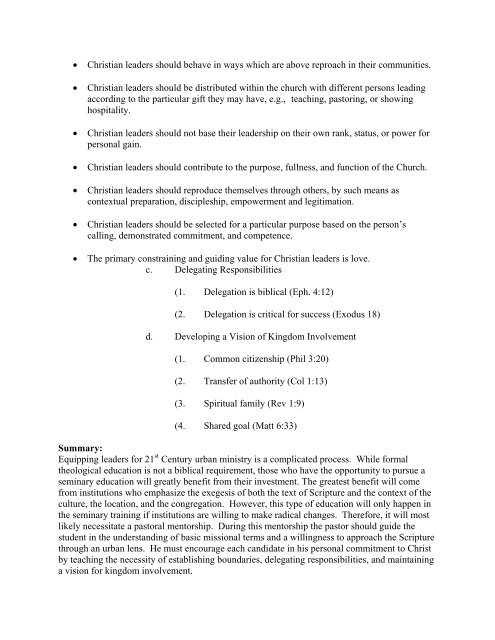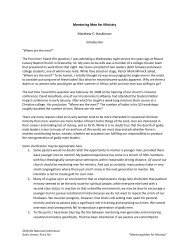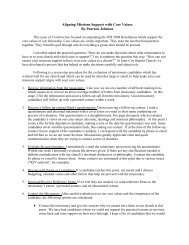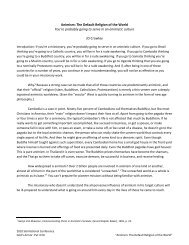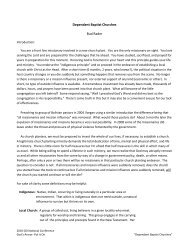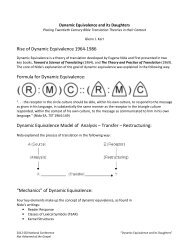Session 1: Why Urban Ministry - Missions Mandate
Session 1: Why Urban Ministry - Missions Mandate
Session 1: Why Urban Ministry - Missions Mandate
Create successful ePaper yourself
Turn your PDF publications into a flip-book with our unique Google optimized e-Paper software.
• Christian leaders should behave in ways which are above reproach in their communities.<br />
• Christian leaders should be distributed within the church with different persons leading<br />
according to the particular gift they may have, e.g., teaching, pastoring, or showing<br />
hospitality.<br />
• Christian leaders should not base their leadership on their own rank, status, or power for<br />
personal gain.<br />
• Christian leaders should contribute to the purpose, fullness, and function of the Church.<br />
• Christian leaders should reproduce themselves through others, by such means as<br />
contextual preparation, discipleship, empowerment and legitimation.<br />
• Christian leaders should be selected for a particular purpose based on the person’s<br />
calling, demonstrated commitment, and competence.<br />
• The primary constraining and guiding value for Christian leaders is love.<br />
c. Delegating Responsibilities<br />
(1. Delegation is biblical (Eph. 4:12)<br />
(2. Delegation is critical for success (Exodus 18)<br />
d. Developing a Vision of Kingdom Involvement<br />
(1. Common citizenship (Phil 3:20)<br />
(2. Transfer of authority (Col 1:13)<br />
(3. Spiritual family (Rev 1:9)<br />
(4. Shared goal (Matt 6:33)<br />
Summary:<br />
Equipping leaders for 21 st Century urban ministry is a complicated process. While formal<br />
theological education is not a biblical requirement, those who have the opportunity to pursue a<br />
seminary education will greatly benefit from their investment. The greatest benefit will come<br />
from institutions who emphasize the exegesis of both the text of Scripture and the context of the<br />
culture, the location, and the congregation. However, this type of education will only happen in<br />
the seminary training if institutions are willing to make radical changes. Therefore, it will most<br />
likely necessitate a pastoral mentorship. During this mentorship the pastor should guide the<br />
student in the understanding of basic missional terms and a willingness to approach the Scripture<br />
through an urban lens. He must encourage each candidate in his personal commitment to Christ<br />
by teaching the necessity of establishing boundaries, delegating responsibilities, and maintaining<br />
a vision for kingdom involvement.


